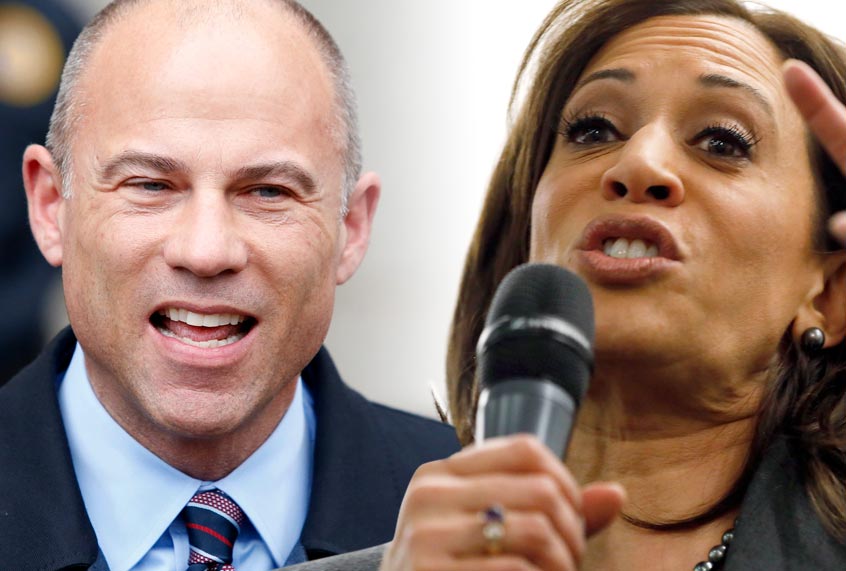Michael Avenatti — the lawyer best known for representing porn star Stormy Daniels, who has said she was paid off by Donald Trump’s presidential campaign to stay quiet about their alleged affair — is now issuing warnings about Sen. Kamala Harris, who is likely to be one of the leading contenders for the 2020 Democratic nomination. He apparently believes that Harris’ past as a prosecutor in San Francisco, and then as California attorney general, could come back to hurt her.
Unfortunately, because of Willie Horton, it is very very difficult for a former prosecutor to be elected President. All it takes is one bad plea deal, where the defendant then later committed a violent crime, and the campaign is over. And almost every prosecutor has at least one.
— Michael Avenatti (@MichaelAvenatti) January 29, 2019
And if Senator Harris is aware of any such plea deal gone bad, her campaign should try and get out in front of it now, disclose it, explain it, and try and move forward. Because I can promise you that journalists and the Repubs will find it. And then it will be too late.
— Michael Avenatti (@MichaelAvenatti) January 29, 2019
I contacted Avenatti to figure out what he was implying, and whether he was referring to anything specific in Harris’ background. “A lot of this is drawn upon my seven to eight years of extensive experience conducting opposition research across the country back in the ’90s,” Avenatti told Salon. “I worked on over 150 campaigns in 42 states — Senate races, gubernatorial races, etc. — and whenever we were running against a prosecutor, we were generally elated, because every prosecutor has at least one if not many plea deals that have gone bad.”
“Plea bargains are a routine part of the system,” Avenatti continued — a fact illustrated by Donald Trump’s former lawyer Michael Cohen, who has admitted to paying off Avenatti’s client, Stormy Daniels, on Trump’s behalf. “But often defendants turn around and commit violent crimes following a plea deal that either diminished the amount of time they spent in prison or placed them on probation,” Avenatti said. “Due to the degree of recidivism in the United States, this is very common.
“It is easy to exploit a situation like that in the political arena, and especially at this level, when running for the presidency of the United States. The likelihood of journalists and/or opponents — whether they be in the primary or otherwise — digging into her prosecutorial background and locating such a plea deal gone wrong is extremely high.”
Avenatti isn’t the first prominent commentator to draw attention to Harris’ law enforcement background. He may well be the first to compare her to Michael Dukakis, the 1988 Democratic nominee, whose candidacy was damaged by the case of Willie Horton, a man furloughed from prison when Dukakis was governor of Massachusetts who then committed a violent crime.
So far, most of the criticisms of Harris’ prosecutorial background have come from the left, including accusations that she sought to uphold wrongful convictions, opposed efforts at police reform, supported the death penalty, resisted marijuana legalization and tried to prosecute parents of truant children. Avenatti said he had not studied those controversies and that his tweets did not refer to any specific cases of “deals that went awry.”
“But I would be surprised if there are not at least a few because of the nature of the job that prosecutors do,” Avenatti said, offering a hypothetical example:
“If she is aware, for instance, of a situation where she agreed to a plea deal for a defendant and that defendant turned around and committed a violent crime — like a rape or a murder or something of that nature — she better get out in front of that,” Avenatti said. “Because if she thinks that that will not surface in this environment, she is sadly mistaken.”
The only way to avoid her political opponents using such a deal against her, Avenatti argued, would be for Harris to acknowledge those mistakes now. “For the people that say ‘No, she must not have anything of this nature in her background because she ran for the U.S. Senate and attorney general and it would have come out by now,’ that’s ridiculous. The level of scrutiny that anyone undergoes when they throw their hat in the ring for the U.S. presidency is exponentially greater — 100 times or more — than anything they faced prior to that.”


